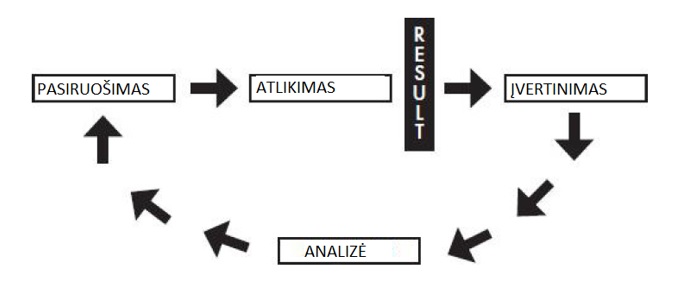
Process model structure the naturally recurring themes in the game of poker so that they can be applied SMM (adult learning model) and the "worm" principles. The end result is consistent play at the highest level, while at the same time steady psychological and technical improvement in poker. The process model can be applied to an individual hand, a session, a tournament, a month, a year or a career.
The process model is not a new invention, it puts some order into the things you already do, builds a foundation for excellence, improves results-oriented thinking and ultimately leads to a consistent game.
The process model consists of five parts that work together:
- Preparation/warming up: what you do before the game. Whether it's planned, accidental or nothing at all
- Implementation: the game of poker itself
- Results: game result
- Assessment: view the result immediately after the game
- Analysis: actively working to improve the game
The process model can be applied to any work, performance or show. So far, you have used it in all walks of life - sport, dating, music, art, writing, business and, of course, poker. Even if you didn't realise it, you have used the process model in some way in your life.
Here is a more detailed look at the process model applied to professional American football and poker:
Preparation/warming up
In professional football, preparation starts immediately after a match and ends just before the next one. During the week, players and coaches review game footage, lift weights, analyse opponents, formulate and practise strategy - all to prepare for a high-level game and win. On the day of the competition, coaches and players follow a defined routine to help warm up their bodies and focus their minds, and review their tactical strategies in order to be fully prepared for competition. They repeat certain elements of the game, listen to music, check their outfits and cheer each other on.
While the details vary in poker, the goal of preparation remains the same - to be ready to perform at your best and win. Preparation is important partly because in poker there is a quality of play range (the bell-shaped curve). Every time you sit down to play, you can perform brilliantly or, conversely, horribly. Preparation is a way to increase the likelihood of performing close to the break-even point (the right-hand side of the curve) and to reduce the chances of a bad game.

Preparation increases the likelihood of a good performance.
How you prepare is a personal choice based on the overall objectives of the game. There are no rules that define the ideal preparation, in the end it is about doing what you think is best.
Some tips on how to prepare for the game:
- Review your long term goals and set goals for the session
- Review your list of the most common poker mistakes
- Review your strategy for improving your psychological game
- Deep breathing, meditation and visualisation
- Listening to your favourite song
CUSTOMER HISTORY
Dusty "Leatherass" Schmidt $3/$6 - $25/$50 NLHE
Pokerstars pro team member
Author of "Don't Listen to Phill Helmuth" and "Treat your poker like a business"
Before I started dating Jared, I had never warmed up before a poker session, so I was vulnerable downswingo effects. I never wanted to feel depressed during a bad period because I would make a fool of myself, and I never liked fools. So together we developed a pre-game routine that prepared me for the bad periods.
Warming up is essential. I've always realised how critically important it is for me to warm up before a golf tournament. In fact, I never even thought of not doing it. Now I feel the same way when I play poker. A great example of this happened recently when I signed up for a few waitinglistswithout first being properly warmed up. Tables started jumping up and down with vacancies I couldn't miss. I thought, to hell with the routine, and started playing.
Within the first 5-10 minutes my hand on the mouse started to shake. I know from my long experience that I tend to get nervous when I don't know what I am doing. Normally I am quite relaxed, but this time my hand started to shake because psychologically I was not prepared to receive so many horrible cards. I didn't play as well as I could and the whole session was a big loss. Whatever happens, I always warm up before a session now.
This series of articles is based on Jered Tendler's book on the psychology of poker, The Mental Game of Poker. If you would like to purchase the original, which is available in English, you can do so at amazon.com





